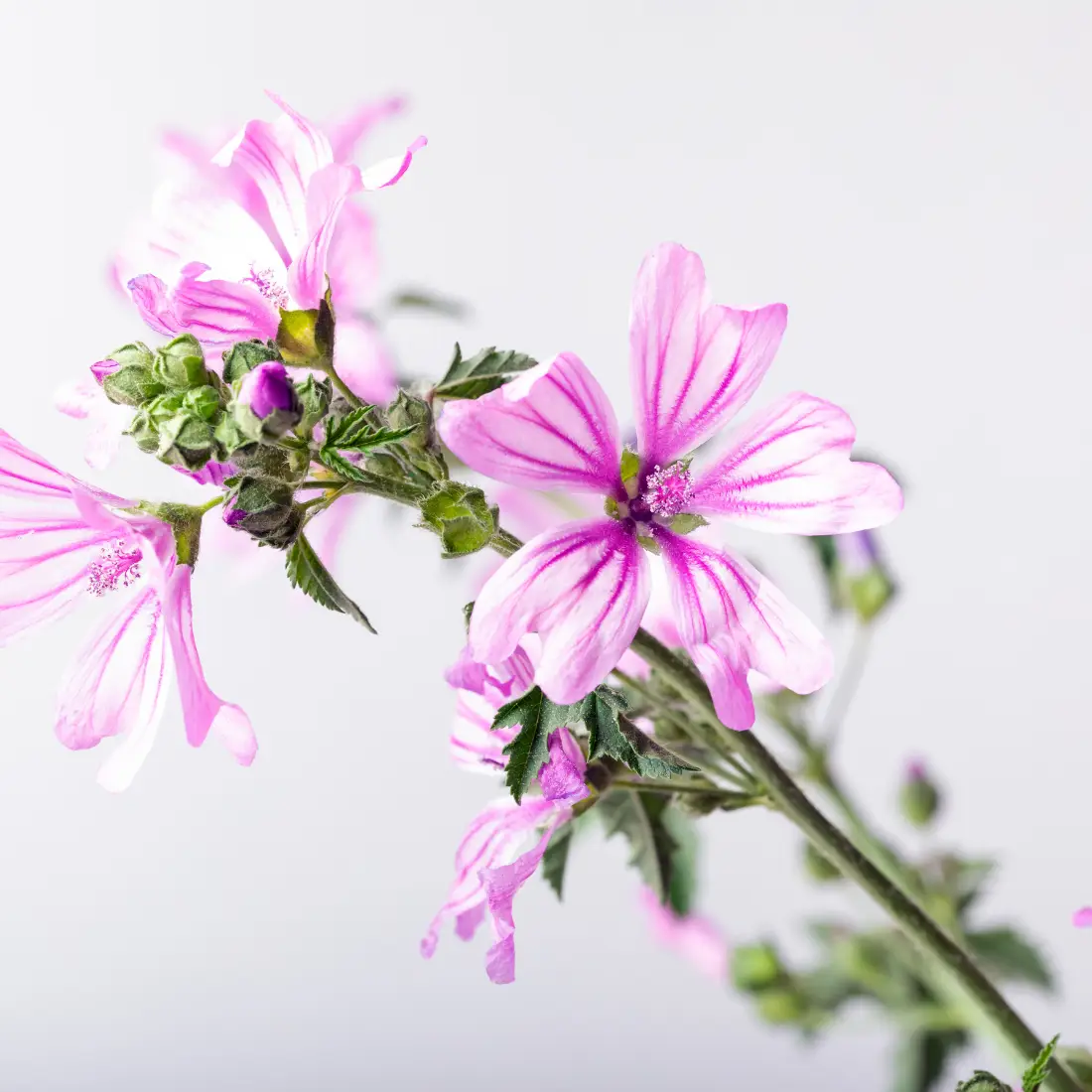Introduction: Do Mallow Leaves Have Caffeine?
In the world of herbal teas and natural remedies, mallow leaves are gaining popularity for their soothing effects and potential health benefits. But there’s one question that often arises when people talk about mallow: Do mallow leaves contain caffeine?
If you’re trying to reduce your caffeine intake or simply want to learn more about the properties of mallow, this article will answer that question and much more. From the basics of mallow to its health benefits, we’ll explore why this plant might be a great alternative to your usual caffeinated drinks.
What Are Mallow Leaves?
Mallow, scientifically known as Malva sylvestris, is a flowering plant in the Malvaceae family, known for its vibrant, purple-pink flowers and large, round leaves. It has been used for centuries in traditional medicine to treat a variety of ailments, including respiratory issues, digestive problems, and skin irritations.
Mallow leaves are commonly consumed as an herbal tea, which is often praised for its mild, pleasant flavor and soothing qualities. The leaves contain various vitamins, minerals, and antioxidants, making them a popular choice for those seeking natural ways to boost their health.
The Caffeine Question: Does Mallow Have Caffeine?
Now, let’s address the burning question: Does mallow contain caffeine?
The simple answer is no, mallow leaves do not contain caffeine.
Unlike plants such as coffee, tea (Camellia sinensis), or yerba maté, which naturally contain caffeine, mallow leaves are caffeine-free. This makes mallow a perfect option for individuals who want to enjoy a warm, calming beverage without the stimulating effects of caffeine.
Why Mallow Leaves Are a Great Caffeine-Free Alternative
For those who are looking to cut back on caffeine or simply avoid it altogether, mallow leaves offer a refreshing, caffeine-free alternative. Here’s why:
1. Gentle on the Body
Mallow tea is known for its calming properties, which can help relax the body and soothe the digestive system. Since it doesn’t contain caffeine, there is no risk of the jitteriness or anxiety that can sometimes result from caffeinated drinks.
2. Perfect for Evening Use
Because mallow leaves don’t contain caffeine, they can be enjoyed any time of day, including in the evening. Many people find that caffeine disrupts their sleep, so switching to herbal teas like mallow in the late afternoon or evening can help promote relaxation without interfering with sleep quality.
3. Good for Sensitive Stomachs
Caffeine can sometimes irritate the stomach, leading to discomfort or acid reflux. Mallow tea, however, is often used to soothe and protect the digestive system, making it a great option for people with sensitive stomachs or those prone to digestive issues.
Health Benefits of Mallow Leaves
While the absence of caffeine in mallow leaves is certainly a major selling point, it’s not the only reason people love this herbal remedy. Mallow leaves are packed with natural compounds that offer a variety of health benefits. Let’s dive into some of the key benefits of this incredible plant:
1. Soothes Inflammation
Mallow leaves contain compounds known as flavonoids, which have anti-inflammatory properties. Drinking mallow tea may help reduce inflammation in the body, particularly in the respiratory system, making it a popular choice for people dealing with conditions like bronchitis or sore throats.
2. Promotes Digestive Health
Mallow has long been used to support digestive health. The leaves contain mucilage, a gelatinous substance that can help soothe the lining of the digestive tract. This makes mallow tea a good choice for individuals with indigestion, constipation, or stomach irritation.
3. Supports Skin Health
Mallow is often used in topical applications for its skin-healing properties. The plant’s anti-inflammatory and moisturizing effects can help calm irritated skin, making it a useful ingredient in natural skincare products. Drinking mallow tea may also support skin health from the inside out.
4. Rich in Antioxidants
Mallow leaves are rich in antioxidants, which help protect the body from oxidative stress and free radical damage. Antioxidants are essential for overall health and can contribute to the prevention of chronic diseases like heart disease and cancer.
5. Supports Urinary Health
Mallow has diuretic properties, which means it can help promote healthy urine flow. This can be especially helpful for people with urinary tract infections (UTIs) or those looking to support their kidney health.
How to Use Mallow Leaves
Mallow leaves are versatile and can be used in a variety of ways. The most common way to consume mallow is by brewing the leaves into a tea. Here’s how you can make your own mallow tea:
How to Brew Mallow Tea:
- Steep dried mallow leaves in hot water for 5–10 minutes. You can use 1–2 teaspoons of dried leaves for every cup of water.
- Strain the leaves and discard them, or leave them in for a more robust flavor.
- Sweeten or flavor as desired. Some people add honey, lemon, or other herbs like chamomile for extra flavor.
You can also find mallow in capsule or extract form, which can be taken as a supplement for a more concentrated dose of its health benefits.
Conclusion: Why Choose Mallow for Your Herbal Tea Routine
Mallow leaves are a fantastic caffeine-free option for anyone seeking a natural, soothing beverage. Whether you’re trying to cut down on your caffeine consumption or simply want to explore the wide world of herbal teas, mallow offers a range of health benefits that go far beyond its lack of caffeine.
From promoting digestive health to soothing inflammation and supporting skin health, mallow leaves are more than just a caffeine-free alternative they’re a powerhouse of natural wellness. So, if you’re looking for a gentle, calming tea to add to your routine, mallow might be the perfect choice for you.






